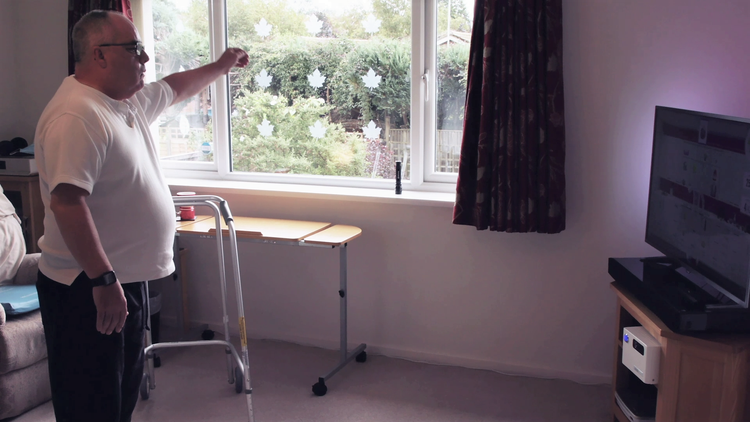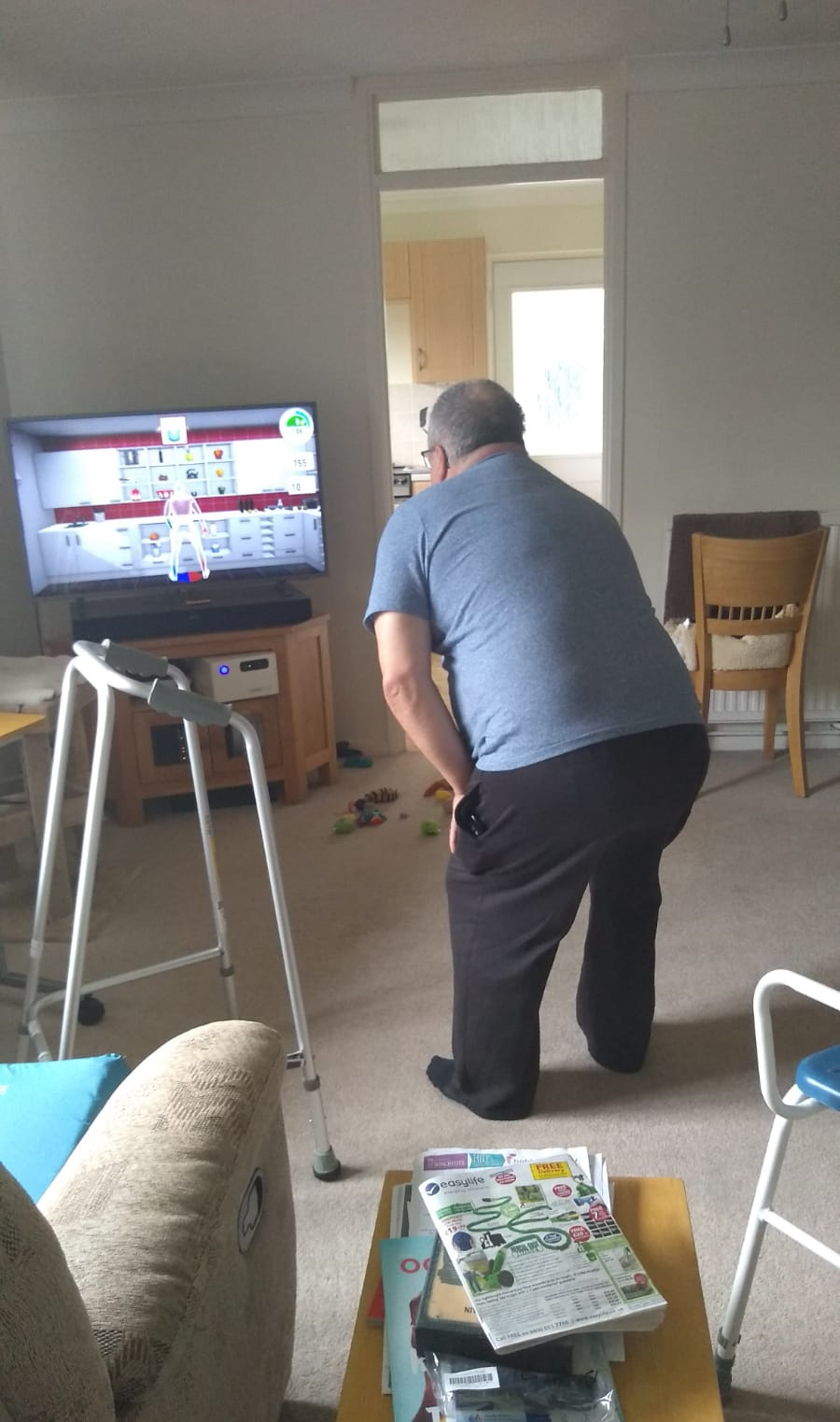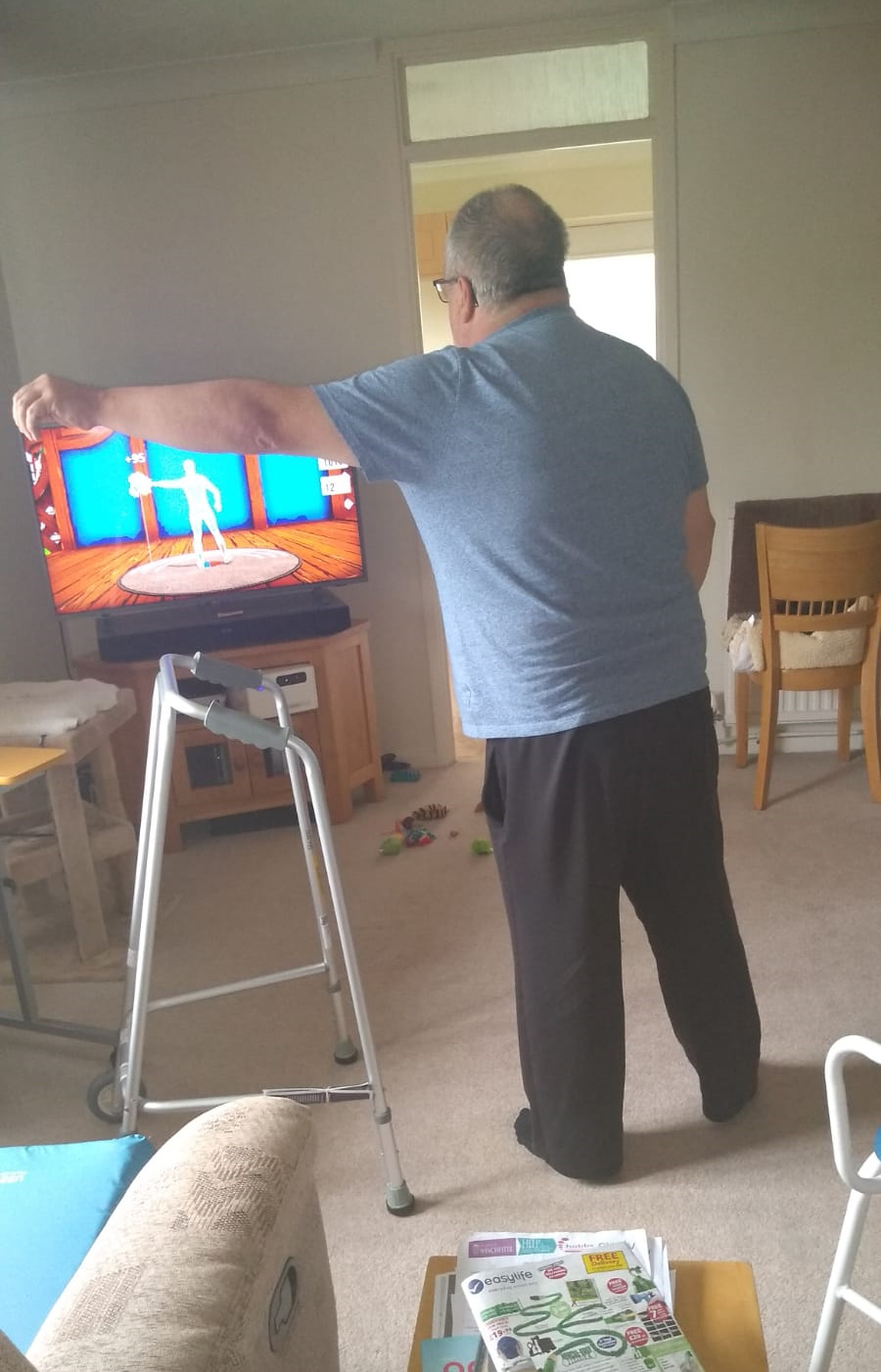
Nigel Skates has been one of the patients to use EvolvRehab and the RehabKit as part of the Hobbs & Winchester University Telerehabilitation project for stroke survivors which was funded by the NIHR Brain MIC.
Nigel, who worked in IT before his stroke, is a big fan of using technology at home to help augment the amount of traditional therapy he is receiving, especially during the the current Covid crisis which has limited his access to such therapy.
In the 5 months that he has used EvolvRehab, Nigel has performed over 8864 reps and near 12 hours of exercise activities in the 71 exergame sessions he has completed. His therapist, Hannah Woods-Hier, remotely supervises Nigel’s therapy programme, and personalises it to his particular needs.
We spoke to Nigel and his wife Lynda to discuss their experience of his using EvolvRehab at home and the improvements they have both seen in Nigel’s overall quality of life since he first began using the system.
Please give us a little information about yourself Nigel.
Nigel: My name is Nigel Skates. I’m 59 and an ex R&D and NOC Manager. My hobbies are photography & home DIY projects.
Can you tell us about when you had your stroke and how it has changed your life?
Nigel: My first stroke was in February 2020. It turned my life upside down. There are lots of things I can no longer do that I was able to do easily before my stroke.

How has COVID-19 affected your life and your rehabilitation?
Nigel: I haven’t been able to join local Stroke Club due to national restrictions. Some therapies have been delivered remotely. Therapists have had to wear PPE which made it more difficult for me to read their body language.
Have you used a technology solution before as part of your rehabilitation?
Nigel: No software, but I have used some therapy equipment like squeezy balls, putty, walking frame, etc.
What do you think about receiving telerehabilitation as a means of augmenting the amount of therapy you receive?
Nigel: Brilliant idea, all in favour of it!
What do you find be the biggest differences between telerehabilitation vs traditional therapy?
Nigel: Telerehab is more demanding because you can’t talk to someone, but telerehab can push you to your limits, with assistance of therapist programming the exercises.
Do you think the NHS should implement telerehabilitation as part of the stroke and brain injury care pathway, even after the Covid-19 crisis is over?
Nigel: Yes I do wholeheartedly.
Has using EvolvRehab helped you? If so, in what way? For example, has EvolvRehab helped you in any everyday functional activities or tasks?
Nigel: Yes, my life has improved no end! I can bend down now. I can use my right arm more. I am more confident in stepping sideways. I can stand independently for longer.
Outside of your physical wellbeing, has using EvolvRehab helped you in any other way?
Nigel: EvolvRehab has improved my self-confidence. It has increased my stamina. It can be a daily challenge which I enjoy.
How do you like using the RehabKit hardware? Do you find it easy to use? Was the initial set up challenging in any way?
Nigel: Yes, I like using the Rehabkit hardware and have found it easy to use.
Would you recommend EvolvRehab and its use for telerehabilitation to other stroke and brain injury survivors?
Nigel: Yes, but the earnest is on the user to make use of it to gain full benefit.
Do you have a favourite virtual activity?
Nigel: Balloon popping – It’s the easiest and the hardest.
Goal setting is important in the process of rehabilitation. What are some of your goals? Has EvolvRehab been able to help you with any of your goals? If so, how?
Nigel: My main goal is to mow my lawn. EvolvRehab is helping me by improving my balance, walking and stamina.
Do you have anything else you would like to share about using EvolvRehab and the RehabKit?
Nigel: It is a wonderful idea and has loads of functional benefits.

Thanks to Lynda Wilson for the photos
We also spoke to Nigel’s wife Lynda who is a nurse and takes a very active role in his post-stroke care, including his use of EvolvRehab. Lynda’s experience as a care giver mirrors that of most spouses of stroke survivors and is an important reminder that stroke doesn’t just affect one person. Our experience here at Evolv is that caregivers like Lynda also need to see a clear benefit of incorporating technologies like EvolvRehab into the home. Her insights both as a nurse and the spouse of a stroke survivor are ivaluable to us and our aim of improving EvolvRehab for people like her.
What are some of the challenges for you as a spouse/partner/family member/caregiver of a stroke or brain injury survivor?
Lynda: It wasn’t just our careers and previous lifestyle as a couple that disappeared, my personal lifestyle has gone too and it all disappeared overnight. It could be argued that we were luckier than many as all my nursing career had been working for people with disabilities, but supporting a Loved One is of course very different emotionally. Whilst we appreciate Nige is lucky to have retained his intelligence, a lot of his disabilities are tricky because they are not obvious. His disabilities and loss of confidence resulted in my becoming his full-time carer and doing most of the things at home that he used to do. Negotiating all these changes and trying to motivate him in his recovery has been draining at times and there really has not been enough hours in the day!
Do you think technology can help with these challenges?
Lynda:Absolutely and for both of us. The reduction in time and effort required from me is huge. It means we do not have to go to anywhere near as many clinical appointments. Even though therapists home visits were easier, they were still hugely exhausting for Nige and demanding for me.
I believe technology can never replace the need for human intervention to assess, demonstrate, support, monitor, etc. However technology can extend and adapt how the patient receives the therapists input, which can be major advantage for the patient.
Telerehabilitation can be used more regularly and for longer than any employed person could ever provide. ‘Playing a game’ can be more engaging to start and more interesting to continue than exercises performed alone.
For some people who find even basic technology difficult, they may take longer to become confident operators and need some more support from others, but for most it will still be achievable. ‘Playing the games’ can be enjoyed by I would think nearly everyone.
I would also suggest EvolveRehab could be useful for many people with physical and learning disabilities who need regular motor skills exercises for their continued physical movement.
What you do you think of your loved one using EvolvRehab at home as part of their therapy?
Lynda: EvolvRehab has been ideal for Nige, mentally and physically. Fatigue and motivation are Nige’s greatest challenges. With EvolvRehab, he can juggle the timing of when he does the sessions with his energy levels and with other commitments e.g. appointments, personal care, social contacts. Additionally his motivation to use EvolvRehab totally surpassed any interest he has shown in doing any of his recommended self-exercises or self-activities. The encouragement of a game target far outweighs a verbal “well done”.
Have you seen any improvements in them since they started using EvolvRehab?
Lynda: Nige started using EvolvRehab after his second debilitating setbacks. He was not able to have regular sessions with therapists at that time. Nige’s improvements in stamina, movement and balance are significant. I also believe EvolvRehab has improved his confidence. He views doing these computer challenges as far more normal than his interpretation of himself being physically supported to exercise because he’s ‘crippled’.